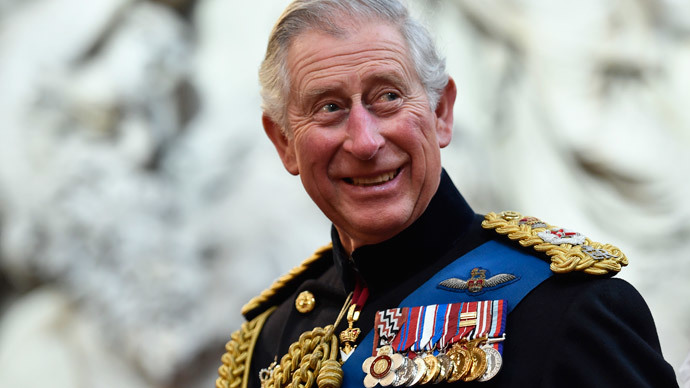‘Black spider’ letters: ‘Supreme lobbyist’ Prince Charles tried to influence elected officials

After a decade of establishment resistance, 16 judges and legal fees of £400,000 shouldered by the taxpayer, the secret correspondences of the heir to the throne intended to influence politicians have been made public.
The royal interventions cover everything from badgers and herbal medicines through to the under resourcing of British soldiers in Iraq. RT looks at a snapshot of Prince Charles’ infamous ‘black spider’ letters.
Badger baiting
In 2005, and despite being a self-proclaimed lover of all things wild, the prince strongly backed a proposed badger cull over the course of a 17-letter exchange with then-Prime Minister Tony Blair.
He did so on the grounds that the animals presented a tuberculosis risk to cattle, blasting anti-cull activists in the process.
“I, for one, cannot understand how the ‘badger lobby’ seem not to mind at all about the slaughter of thousands of expensive cattle,” he said, “and yet object to a managed cull of an overpopulation of badgers – to me, this is intellectually dishonest.”
British troops under resourced in Iraq
The heir, who is the honorary head of over 30 military units, clandestinely wrote to Blair warning that UK troops in Iraq were severely under resourced.
READ MORE: ‘I won’t be used to peddle UK arms in Middle East’ – Prince Charles
READ MORE: Obama & Prince Charles in US talks, MidEast likely to top agenda
READ MORE: 'Outrageous!' Moscow hits back at Prince Charles over Putin-Hitler comparison
“The aim of the Ministry of Defence and the Army's Air Corps to deploy this equipment globally is … being frustrated by the poor performance of the existing Lynx aircraft in high temperatures.
“Despite this, the procurement of a new aircraft to replace the Lynx is subject to further delays and uncertainty due to significant pressure on the Defence Budget.”
“I fear this is just one more example where our Armed Forces are being asked to do an extremely challenging job (particularly in Iraq) without the necessary resources.”
Herbal medicine
Charles expressed his concern to Blair over what he regarded as excessive EU regulation of herbal medicine, writing that the European Union Directive on Herbal Medicines was having “a deleterious effect on the complementary medicine sector in this country by effectively outlawing the use of certain herbal extracts.”
He even offered to help clarify the issue, writing: “I think we both agreed that this was using a sledgehammer to crack a nut. You rightly asked me what could be done about it and I am asking the Chief Executive of my Foundation for Integrated Health to provide a more detailed briefing, which I hope to be able to send shortly so that your advisers can look at it.”
Patagonian Toothfish
While the scourge of the humble badger, Charles proved to be a stalwart ally of more exotic specimens including the Patagonian toothfish and the albatross.
In 2004, he wrote to Environment Secretary Elliot Morley on the topic: “I particularly hope that the illegal fishing of the Patagonian toothfish will be high on your list of priorities because until that trade is stopped, there is little hope for the poor old albatross, for which I shall continue to campaign.”
Healthcare woes
As well as his interest in alternative medicine, Charles took an interest in the redevelopment of certain hospitals.
In 2005, he wrote to then Heath Secretary John Reid expressing his interest in developing an old asylum in Sunderland into a hospital.
“I hope you will forgive my persistence on this issue,” he said, “but, despite your helpful updates, the log-jam to which I referred in my letter of last August shows little sign of alleviation and it saddens me greatly to think that the immense progress and collective enthusiasm gathered 12 months ago is now in danger of being lost.”
Fairness for farmers
In his various letters on agriculture, the Prince displays a deep knowledge of the industry as he lobbied for fairer treatment of farmers by supermarkets.
“There is no doubt that the dominant position of the retailers is the single biggest issue affecting British farmers and the food chain, and if it is not dealt with all the other good work which has been going on risks becoming virtually useless.”
Response to publication
Labour MP Paul Flynn called the Prince the “the lobbyist supreme in the land,” arguing his opinion should not count more than anyone else’s.
“They show he is putting forward a whole variety of views – including many bad science views and others that should have no more weight than the man down the pub,” said Flynn.
“We can see his views were given a seriousness and priority they did not deserve.”
Former Foreign Secretary Jack Straw, who was the architect of the Freedom of Information Act under which the Guardian newspaper originally tried to access the letters, said the courts had overstepped their authority by releasing them.
“The heir to the throne is going to have some views,” he said. “If you want a constitutional monarchy it is important that those views are known but they are only known in private.”
As the letters were revealed, a royal spokesperson said: “The publication of private letters can only inhibit his ability to express the concerns and suggestions which have been put to him in the course of his travels and meetings.
“The Prince of Wales is raising issues of public concern, and trying to find practical ways to address the issues.”
The heir’s office added that the Prince, who may one day be the unelected monarch of the nation, “cares deeply about this country, and tries to use his unique position to help others.”












